Breeders’ Martin Freeman Discusses Season 3, the Value of Taking Breaks, and His Need-To-Know Marvel Status
He has a Marvel character and a Middle-earth character. He was Arthur Dent in The Hitchhiker’s Guide to the Galaxy and Dr. Watson in Sherlock. How does his Breeders dad, Paul, fit in?
Breeders, FX’s comedy about parents who love their kids even as they do everything to try their patience, returns Monday with a bit of dust to settle. Namely: what happens between Paul (Martin Freeman) and his son Luke (Alex Eastwood) after a season 2 finale which saw 13-year-old Luke punch Paul, who then moves out of the family home. Coming right back to the incident breaks the program’s established plan for time-jumps between seasons, but as Freeman told Rotten Tomatoes recently, “At the end of a [season], if a son punches a father in the face, you have to follow that up. You can’t skip ahead five years and pretend that didn’t happen. It’s such a momentous event that we didn’t want to skip over that.”
Nevertheless, the time jump between the first and second season was always part of the overall plan for the series, as is Paul’s anger. But in a conversation which included the program’s growing complexity, how actors swear in front of kids, and what his Marvel dossier look like, Freeman maintained the punch is a pivotal part of the Worsley’s ongoing story.
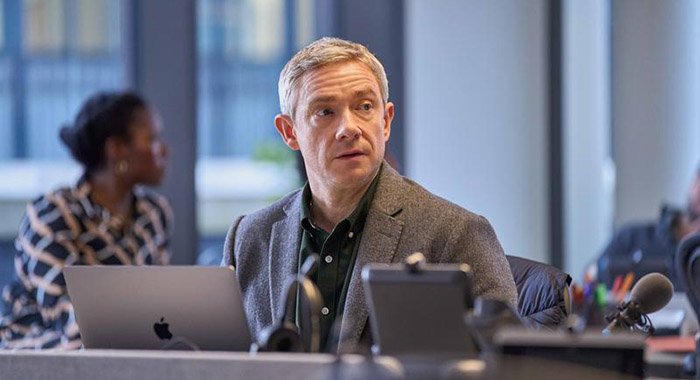
(Photo by Rory Mulvey/FX)
Erik Amaya for Rotten Tomatoes: Paul’s anger continues to be an element of the series. And since the show has this commitment to honesty, it’s clear that it can’t just disappear, but do you think he truly sees Luke punching him as a wake-up call?
Martin Freeman: Yes, I think he does. I suppose it is one of those times in someone’s life where it’s reached such a point almost of no return. I think Paul is very self-aware. He knows he has a problem with his anger, and he knows that whatever happens with his kids, he’s obviously had some part in that. Maybe not all of it, but he played some part out, for better or for worse. So, yeah. I do think he sees that as a turning point, but at the same time, he still wants what he wants. Paul wants to be under the same roof as his family. So even though he will acknowledge that he’s had a part to play in that, he’s going to try and do whatever necessary to get back into the family fold.
One interesting element is when he and Luke finally talk about it, Paul mentions he will backslide. And it seems as though Paul trusting him with that is kind of key to changing their dynamic into something healthier, even though he almost immediately loses his cool in the next scene.
Freeman: Yeah. Yeah. That’s what I mean. I think he’s always been self-aware, and he’s always been happy to share his vulnerability and his shortcomings as a parent. It’s the difference between how he felt in one of the early flashbacks we see when he becomes a father for the first time — and he’s a man who was just taking every blissed-out drug in the world — he’s so happy. Nothing could have made him happier. It is a completely idyllic moment juxtaposed that with the reality, several years later, of him screaming in the face of his kids. He’s always known that there’s quite a difference between where he wants to be and where sometimes he is. And sometimes, to be fair, he is in a good place with Luke. He’s a loving father as Ally [Daisy Haggard] is a loving mother.
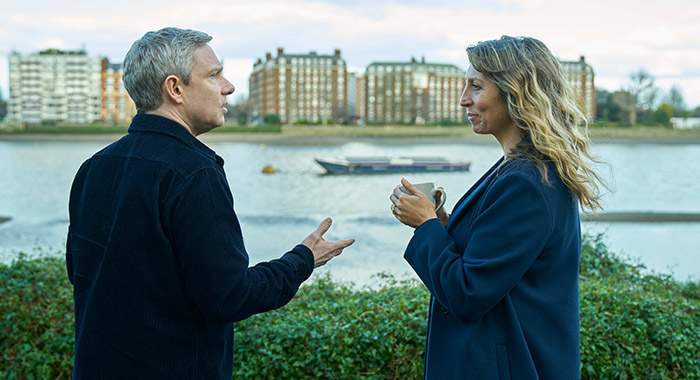
(Photo by Mark Johnson/FX)
What I like about the show is that it doesn’t over-correct, because, obviously, it’s not The Brady Bunch, but nor is it The Omen, either. They’re not incapable of showing demonstrable love, and they’re still tactile with each other and they still check in with each other. But the underlying tensions don’t just go away. They don’t in real life. Nothing just goes away like that, just because a thing happens.
You see that earlier on in the series — at the end of [season] 1 — where Paul knows Luke has been life-threateningly ill. And Paul prays that, if he gets through this, “I will never lose my temper with him. I will never have rage again. I promise you, God” or David Bowie, as he prays to, “I will be a much better father.” Cut to: he’s immediately screaming at his son because we do tend to forget those pacts and those promises we make, when a different set of circumstances present themselves. And yeah, Paul’s no different and this situation is no different, but he does know it’s not good to have your 13-year-old boy punch you in the face and draw blood. He knows that’s not in any way healthy.
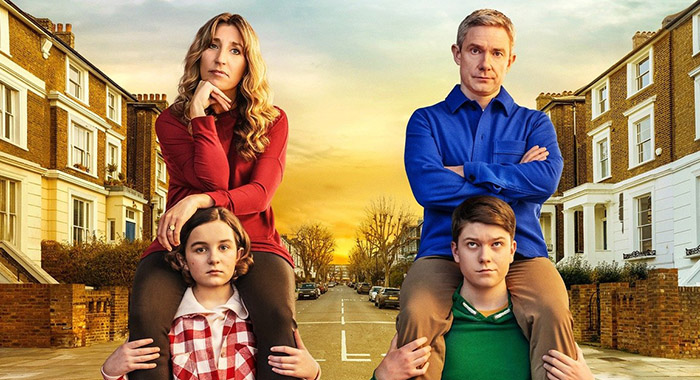
(Photo by FX)
Was reaching for this sort of complexity part of the mission statement for the season?
Freeman: I think to keep a bit of complexity and to keep shades of gray was always part of the mission statement of the whole show, really. We always wanted to reflect [that] when they get on, they really get on. That’s real. You know? And even when they don’t get on, it’s not because they don’t love each other. Love underpins all of it, everything in the show.
But yeah, of course, sometimes it’s easier to demonstrate that than other times. I love the combination now of how Luke and Paul are getting on with Ava [Eve Prenelle] and Ally and how strongly Ava wants Paul back in the family home to the extent that she says to Luke, “I don’t care about your anxiety.” Because Luke says, “I can’t have that back because you know he triggers my anxiety.” And Ava says, “I don’t care about your anxiety. What about me?”
It’s that age-old conundrum: If you are “the easy child” and the one who’s presenting less problems, are you going to get ignored and are you going to get trammeled on because you present less problems than the other people do? I think Ava’s obviously running into that feeling of, “Because I’m sensible and grown up and mature and all that, it doesn’t mean that I’m not a kid with needs and wants. I’m really upset that my dad isn’t living in our house, and frankly, Luke, I kind of blame you for it.” Which is a brave thing to say, actually. And when I read that in the script, I thought, “Oh, I love that.” I just love Ava, just standing up and going, “I don’t give a sh*t about your mental problems, whatever you are going through. No one’s listening to me. I like the fact she sticks up for herself.
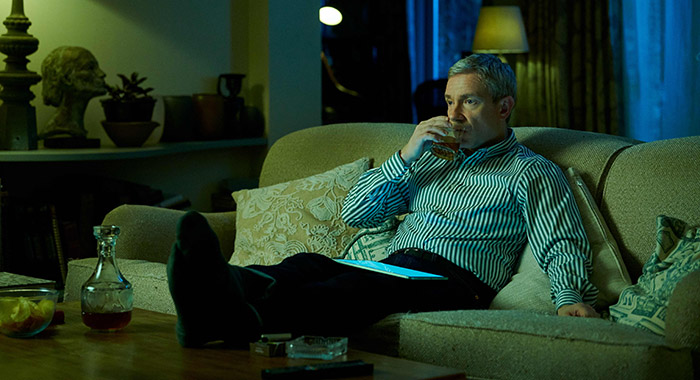
(Photo by Rory Mulvey/FX)
Was the freedom Paul finds by staying at his mother-in-law’s house a genuine temptation or is it just really just that exhilaration of being away from it all for a little bit?
Freeman: I always thought that was funny when we were talking about these ideas for [season] 3. He genuinely wants to be back in the family home — that is a completely genuine, real desire. But at the same time, he’s got this house that is empty and he can have a whiskey, and he can work on his laptop. It’s complete peace and quiet. He hasn’t had that since before he was a father. That’s quite a magnetic pull. So I like the fact that he’s wrestling with that thing of, if someone asked him what his feelings were, his answer would be, “No, I would leave my whiskey and my Cordon Bleu cooking and the peace of the house. I’d be back in my family house in a heartbeat.” But really viscerally, of course, he really enjoys the peace and quiet, like people do. People do like a day off, or a week off, or a month off. You know? It doesn’t mean you don’t love your family. It just means you want to a week off.
It also feels like he’s more centered for the experience.
Freeman: But he’s also occasionally still fighting that inner voice going, “Why the hell am I answerable to a 13-year-old boy?” It’s a genuine belief of his that you should not be on the backfoot to your children because they’ll end up spoiled brats. If they’re in charge from a very early age, he doesn’t want that, because he loves his kids. But also, Luke is growing up and he is going to have some truths to tell to Paul. And Luke is sometimes just going to be right. Paul has to accept that. His son is not a small child. He’s going to have insights that are worthy.
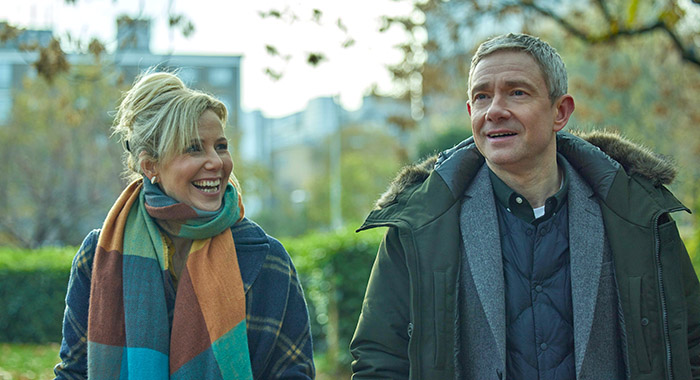
(Photo by Rekha Garton/FX)
Between the kids getting to that worthiness and few other things in the new season, aging is very much part of the story. Do you think that featuring those sorts of issues in any way is instructive for a slightly younger viewer, or will nothing prepare anyone for the shock of aging?
Freeman: Maybe nothing works. And I’m not sure it would’ve worked for me. Because you pay lip service to it, and you go, “Oh really? Oh right. That’s interesting.” I don’t think it can go in anymore than it can with what it will be like to be a parent before you’re a parent. You can understand it with your brain, but you don’t understand it in your bones.
Is there a standard practice in regard to swearing in front of the child actors? Is that an individual choice? Is that something that’s discussed with the child actors or their parents?
Freeman: I think it’s an individual choice. I know sometimes I take some f—s out. I know that, because there’s a lot of … I swear a lot in real life, and I grew up in a house where swearing happened, and I have a house now where swearing happens, but sometimes it can take you out of it a little bit. I always wanted it to be shocking when it should be shocking. And also sometimes just like a punctuation when it’s like punctuation because, sometimes in life, it is like punctuation.
Occasionally, I take them out. I don’t particularly take them out for the kids because during [season] 2, the [older] kids’ parents gave us the permission to swear in front of them. There are a couple of words that we don’t say in front of them. In the flashbacks, when we’re going to the younger Luke and Ava [George Wakeman and Jayda Eyles], those actors are younger, and we don’t swear in front of them, we’re still saying “fudge,” and “don’t be a silly clock,” or whatever.
Another interesting aspect of the show is the non-confrontational depiction of Christianity, especially in the episodes with the vicar who is so empathetic. It feels rare.
Freeman: It started in [season] 2 when Ava became a bit religious. We went through a couple of versions of that script. I was always very conscious of us not just doing what most people in our line of work do, which is judge religious faith of any kind. I think there’s that sort of general go-to, not in an aggressive way, but I think it’s definitely there. We definitely wanted to pull back on that.
The people she’s around and her belief, whatever it is, as it’s growing in her head, doesn’t need to be stupid or ideological. She’s letting her brain go wherever it’s going to go and this thing is interesting to her. And why not have the people around it not be fire and brimstone? I’m not a deeply religious person, but my objection is a lot of the time in film and television, at least in the west, it’s almost like as soon as you see a character with a crucifix on that’s shorthand that they’re going to be a nut job a lot of the time. So I think we have to be careful of it. And why not make that character of the vicar a cool person? We don’t have to make her an ideologue or a sort of scary religious maniac, because I think most people are actually not like that.
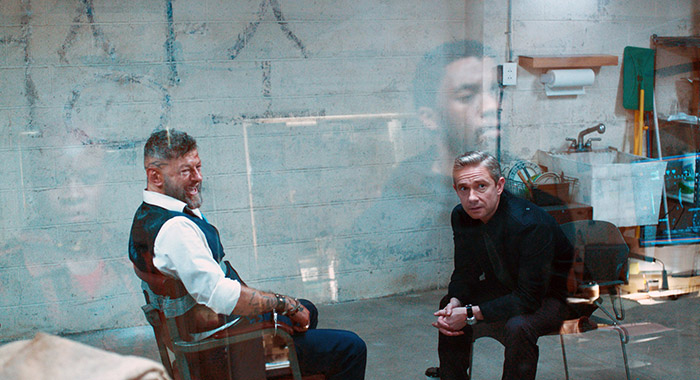
(Photo by © Marvel / © Walt Disney Studios Motion Pictures /Courtesy Everett Collection)
Switching gears, the Paddington films are mentioned in Breeders season 3. You have a Marvel character, you have a Middle-earth character, you were The Hitchhiker’s Guide to the Galaxy’s Arthur Dent, but will the pop culture part of your resumé be incomplete without Paddington 3?
Freeman: [Laughs] Well, I really, really enjoy the Paddington films, like a lot. I love watching those with my kids. I think they’re wonderful. Who knows? I do remind my girlfriend quite a lot of Paddington. So yeah, maybe squaring in that circle [someday].
On the Marvel front, how do you keep up with things in between appearances? Do you get some sort of a dossier?
Freeman: I keep up to a certain extent with what I can and what’s relevant to me and my character. So, I will know what I need to know. And beyond that, of course, I’ll know some stuff, but I’m probably slightly less across it than [Marvel Studios President Kevin Feige] is because there’s only so many hours in the day. That would be a lot of homework and I wouldn’t get much else done, but I know what I need to know as Everett Ross. I love coming in and out of that world. It’s a real pleasure.








